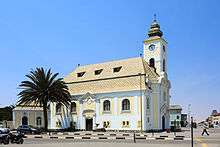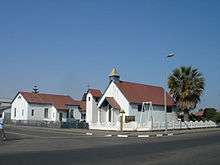Religion in Namibia
Religion in Namibia is dominated by Christianity, with more than 90 percent of Namibian citizens identifying themselves as Christian. According to the United States DRL, in 2007 up to 75% were Protestant, including as much as 50% Lutheran.[1]
Religion in Namibia
According to the Namibia Demographic and Health Surveys (2013), the proportions are:[2]
- 65.1% Protestant (43.7% Lutheran, 4.4% Seventh-day Adventist, 17.0% Anglican/other);
- 22.8% Roman Catholic;
- 10.5% a non-Christian religion;
- 1.5% declared not to belong to any religion.
Foreign missionary groups operate in the country. The Constitution provides for freedom of religion, and the Government generally respects this right in practice. The US government received no reports of societal abuses or discrimination based on religious belief or practice in 2007.[1]
Lutheranism

The largest Christian group in Namibia is the Lutheran church, which consists of three church denominations.
The Evangelical Lutheran Church in Namibia (ELCIN) grew out of the work of the Finnish Evangelical Lutheran Mission (earlier known as the Finnish Missionary Society) which began in 1870 among the Ovambo and Kavango people. It has episcopal polity and consists of two dioceses.
The Evangelical Lutheran Church in the Republic of Namibia (ELCRN) grew out of the work of the Rhenish Missionary Society from Germany which began working in the area in 1842. It operates the Evangelical Lutheran Church AIDS programme, a business trust operating retreat centres, and a training centre for women which provides training for female leadership roles in society including nursery nurses.[3]
The German-speaking Evangelical Lutheran Church in Namibia (ELCIN-GELC) is the smallest of the three churches (approximately 4,500 members). It has episcopal polity, with a single bishop as its leader.
In 2007 the three Lutheran denominations established the United Church Council of the Lutheran Churches in Namibia, with the ultimate aim of becoming one church.[4] The two English-speaking denominations (ELCIN and ELCRN) train their clergy together at a single united seminary, and operate a number of common social programmes.
Roman Catholicism
The second-largest Christian denomination is Roman Catholicism, and accounts for more than 20% of the population. It consists of three jurisdictions - the two dioceses of Windhoek and Keetmanshoop, and the Apostolic Vicariate of Rundu which is in the process of becoming a third diocese.
An apostolic prefecture was established as early as 1892, but the current metropolitan province and ecclesiastical structure was erected more recently, in 1994.
The Holy See maintains diplomatic relations with Namibia through a titular Apostolic Nunciature, but it is unstaffed, and in practice is vested in the Apostolic Nunciature to South Africa in Pretoria.
Other Christian churches

The Anglican Church consists of a single diocese (Anglican Diocese of Namibia), forming part of the Metropolitan province of Southern Africa. It is strongest in the north of the country. The Namibian Anglican church gave strong opposition to the imposition of apartheid policies during South African occupation, as a result of which a succession of Anglican diocesan bishops, suffragan bishops, and vicars-general were deported. The Anglican church worships principally in the English and Kwanyama languages.
Smaller numbers are affiliated with the Baptist Church, the Methodist Church, the Church of Jesus Christ of Latter-day Saints (Mormons), the New Apostolic Church, the Seventh-day Adventist Church, Branhamism, a number of Zionist Churches (practicing a mixture of traditional African beliefs), and Pentecostal Christianity. The Dutch Reformed Church of Namibia is predominantly made up of members of the Afrikaner ethnic group.
Non-Christian religions
Practitioners of other religions are predominantly immigrants, descendants of immigrants, or recent converts. They reside primarily in urban areas.
Islam is practised by a minority, with Muslims in Namibia being almost exclusively Sunni.[1] The total number of Muslims in the country is in dispute, with estimates ranging from less than 1%[1] to 3%.[5]
Other religions practised in the country include Judaism (with about 100 members[6]), Buddhism, and the Baha'i Faith.[1]
Indigenous religions are practiced by the small Himba and San ethnic groups, which comprise less than 1% and 3% respectively of the population.[1]
There are few atheists in the country.
Clerical misconduct in Namibian churches
It has been reported that senior church officials and pastors in Namibia are involved in mismanagement of the churches' funds of millions of Namibian dollars. Many pastors were involved in scams and other serious criminal activities such as rape or handling of counterfeit currency of millions of U. S. dollars.[7][8][9][10][11][12][13] This has resulted in serious spiritual and moral degradation of the church environment and church leaders.[14] The Namibian government is to investigate and combat such illegal practices so as to maintain the integrity, dignity, esteemed purpose, and high standards of such religious institutions in Namibia.[15][16]
See also
- Islam in Namibia
- Roman Catholicism in Namibia
- History of the Jews in Namibia
References
- International Religious Freedom Report 2007: Namibia. United States Bureau of Democracy, Human Rights and Labor (September 14, 2007). This article incorporates text from this source, which is in the public domain.
- https://dhsprogram.com/pubs/pdf/FR298/FR298.pdf
- "Evangelical Lutheran Church in the Republic of Namibia". World Council of Churches. Retrieved 15 October 2016.
- "Archived copy". Archived from the original on 2013-02-08. Retrieved 2013-12-14.CS1 maint: archived copy as title (link)
- IslamOnline.net- News
- "Namibia: Virtual Jewish History Tour". Jewishvirtuallibrary.org. Retrieved 2013-08-01.
- "Pastor Abner prayed while raping minor". The Namibian. 30 November 2010. Archived from the original on 10 November 2014. Retrieved 1 November 2014 – via MISA Namibia.
- Ekongo, John (30 November 2010). "Pastor dupes land seekers". New Era. Archived from the original on 15 May 2012. Retrieved 1 November 2014.
- Kisting, Denver (7 October 2011). "Pastor in court over N$700 000". The Namibian. Retrieved 1 November 2014 – via allafrica.com.
- Mongudhi, Tileni (4 June 2010). "Church fleeced of half a million". The Namibian. Retrieved 1 November 2014.
- Mongudhi, Tileni (27 September 2010). "Pastor found guilty of losing church money in scam". The Namibian. Retrieved 1 November 2014.
- Dentlinger, Lindsay (2 February 2005). "Punches fly: Catholic rift turns violent". The Namibian. Retrieved 1 November 2014.
- Menges, Werner (18 November 2010). "Church feud settled in court". The Namibian. Retrieved 1 November 2014.
- "PASTOR TURNS PARLIAMENT GARDENS INTO LOVE NEST". The Sun. 2011-04-07. Archived from the original on 2012-04-25. Retrieved 2011-10-16.
- "Tired Of 'Fake' Pastors". The Namibian. Archived from the original on 2012-06-06. Retrieved 2011-04-15.
- "Church fraud exposed". The Namibian. 2012-04-27. Archived from the original on 2012-09-08. Retrieved 2012-04-27.